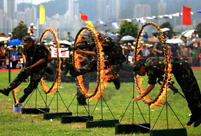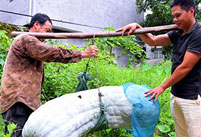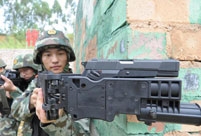UNITED NATIONS, Sept. 25 -- Information from the Ebola battlefront in West Africa painted a very gloomy picture: Ebola is raging and is killing more than 200 people a day, whereas the deadly virus respects no international borders, it has become not just a problem for the hardest-hit countries, but a life and death challenge facing the global human community.
The cruel reality prompted UN Secretary-General Ban Ki-moon to convene a high-level meeting Thursday to respond to the largest and most deadly Ebola outbreak the world has ever seen.
The event, which came on the sidelines of the annual high-level UN debate, brought together heads of state and government, and high-ranking officials from UN member states in solidarity with the people of Guinea, Liberia and Sierra Leone -- the three hardest-hit countries where more than 2,900 people have been killed by the disease since its outbreak early this year.
So far, there have been 5,843 recorded cases of Ebola, including 2,917 deaths. The World Health Organization (WHO) predicts that if the disease is not brought under control, the number of cases could easily exceed 20,000 by early November.
The Ebola virus was detected in the remote jungles of southeastern Guinea in March and quickly spread across the border to Liberia and Sierra Leone. It has also briefly touched Nigeria.
"Several months down the line, the international community is finally coming around to the better view that the Ebola outbreak is a challenge for everyone," Ernest Bai Koroma, president of Sierra Leone, told the high-level UN meeting.
Reality is characterized by the reported figures: only 18 percent of Ebola patients in Liberia are being cared for in hospitals or other settings that reduce the risk of transmission by isolating them from the rest of the population.
Sierra Leone, struck by Ebola for the first time ever, and other West African countries at the frontlines of this fight " require the heavy aerial and ground support of the world to defeat a disease worse than terrorism," Koroma said.
In fact, Ban said that contributions of member states "are falling significantly short of the 20-fold surge that is required. " One of the key shortfalls, United Nations officials and aid workers have said, is the urgent need for countries to agree to transport and treat aid workers who become infected. The UN emergency mission, which is based in Accra, Ghana and led by Anthony Banbury, is preparing to deploy personnel to the region this weekend.
At present, urgently needed are more treatment centers, labs and equipment, more clinicians, nurses and other health workers in treatment and holding centers, more training for national doctors, nurses and other health workers on safe and effective clinical and nutritional interventions, and information managers, according to the Sierra Leonean president.
Many countries moved up in response to the crisis, but some did go in the wrong direction. As the secretary-general put it: "Many have tried to shut out the virus by closing their borders. Several airlines have stopped serving the three countries. The number of ships docking at their ports has dwindled. But such an approach only makes the situation worse, isolating countries when they need help most."
In sharp contrast, China did the right thing by dispatching medical workers and earmarking millions of U.S. dollars to aid the three West African countries. "The epidemic may be merciless, but love is trans-boundary," said Foreign Minister Wang Yi of China, " We have 1.3 billion people standing with you."
The Chinese move has been hailed by the international community as an action of a responsible developing power.
With the incoming international assistance on the rise, encouraging news is being reported: In some treatment centers, patients are receiving the care they need. In several locations, community-based programs are yielding promising results.
There is still a long way to go before the international community brings the Ebola crisis well under its control. To this end, the concerted world efforts are required simply because Ebola as a disease is so dangerous that even an hour too late leads to exponential transmissions.
That is why faster response, of a kind similar to responses to natural disasters like hurricanes and earthquakes, is required. This calls for faster deployment of resources at the global, national and local levels. Any break in this chain of fast response would result in more deaths in West Africa and greater possibility of the virus mutating and spreading into other countries and continents.
 Century-old public bath closes door in Beijing
Century-old public bath closes door in Beijing Military training in Hong Kong
Military training in Hong Kong Teahouses in Chongqing: Worship to the leisure lifestyle
Teahouses in Chongqing: Worship to the leisure lifestyle Giant white gourd weighing 87 kilograms appears in SE China
Giant white gourd weighing 87 kilograms appears in SE China Advanced arms help to safeguard China-ASEAN Expo
Advanced arms help to safeguard China-ASEAN Expo Leading director Wang Quan'an detained for 'buying sex'
Leading director Wang Quan'an detained for 'buying sex' Heaven on earth: Dongjiang Lake in Hunan
Heaven on earth: Dongjiang Lake in Hunan Mixed reaction to smartphone sidewalk
Mixed reaction to smartphone sidewalk Amazing aerial photos of China's Xisha Islands
Amazing aerial photos of China's Xisha Islands Lingerie show at 2014 Miss China
Lingerie show at 2014 Miss China Songstress Li Xianglan dies at 94
Songstress Li Xianglan dies at 94 Police recruiting posters
Police recruiting posters Anshun Daxi- Living fossil of Chinese drama
Anshun Daxi- Living fossil of Chinese drama Urban farmers in China
Urban farmers in China 'Firepower-2014 Weibei'military exercise
'Firepower-2014 Weibei'military exerciseDay|Week|Month